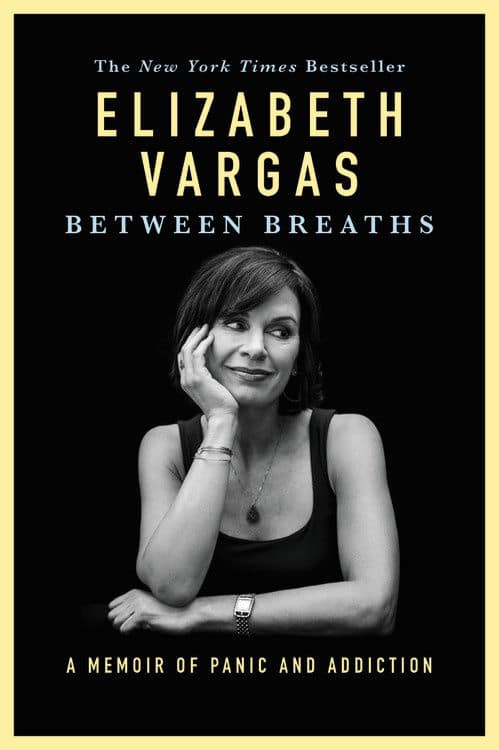I’m sure we’ve all fantasized about being at the top of our chosen profession, or maybe some other profession.
Even better, how about being at the top of your chosen profession and also blazing a trail for others.
What we don’t expect to do when that happens is to reach that pinnacle of success and then – with no warning – to walk away. That takes some, as we say in Texas, el Grande cajones.
Well that’s what Elizabeth Vargas did. She was the anchor of World News Tonight on ABC, a highly decorated and respected reporter and broadcaster. She was at the top of her game, showing other women that they, too, could have it all – a profession, a family, respect, a social life and physical and emotional health. It was that last bit where she faltered a bit. Elizabeth Vargas was an alcoholic.
Vargas communicated her story to more than 700 attendees on Tuesday, June 6, at the Hilton Hotel. She was speaking at the 29th Annual Jim Bradshaw Memorial Stars in Recovery Luncheon benefiting the Recovery Resource Council.
“Like so many women, I was juggling like mad,” she said. “I was working a high-profile, demanding job, I was the sole breadwinner for my family, and even with that fact, I still got all the birthday emails and play date requests and ‘can you cook some cupcakes for the school bake sale.’”
She was her own worst enemy. “I took on too much, I tried to juggle too much, and what became even more stressful for me: I would drink too much,” she said.
Obviously a high-functioning alcoholic, Vargas traces her need to drink back to her early childhood when her father went to fight in Vietnam.
Growing up on an Army base in that situation caused the six-year-old Vargas to develop a deep and abiding anxiety. When her mother left to give birth to Vargas’ younger sister, she panicked.
“I couldn’t help myself: I jumped out of bed and started running through the house to the front door to stop her. And that’s when my neighbor who’d come to watch us grabbed my arm and stopped me and said, ‘What are you doing? What is the matter with you?’”
At that moment, Vargas said, she “realized my panic, my anxiety, my fear was shameful, and was something I must hide.”
She “literally white-knuckled my way through childhood and adolescence,” she said.
Surprisingly, she made it through college mostly alcohol free. But once she began her upward career trajectory things changed.
After her second child was born, Vargas knew something was wrong, “something had changed for me with my relationship to alcohol.” Vargas couldn’t sleep and that anxiety was becoming overwhelming.
She went to an expert in postpartum depression. The doctor told her to take a hot bath, drink a glass of wine and take an Ambien. But the nightly glass of wine wasn’t working. What had once soothed her anxiety, was instead fueling it.
Despite the fact she was now hiding the empty wine bottles from her husband, Vargas was a self-discipline machine, rising every morning for a fierce workout. “I was at the gym every day, I ate very, very healthy, was very, very careful about everything except this one thing in my life.”
But it began to catch up to her. “There were the box seats to the U.S. Open tennis tournament that I missed because, by that point some mornings, the hangovers were just too much, even for my intense workouts at the gym.”
Still, she didn’t resemble the image of an alcoholic that she, and most of us, have in our minds. “Alcoholics were bedraggled men living under bridges, drinking out of paper bags,” she said. “They weren’t wives, mothers, network television anchors, and that denial kept me from seeking help long after the turning point when anybody who could lift the curtain and see what was really happening in my life knew that I had a problem.”
Despite her hidden issues, Vargas was an ace reporter, traveling to the Gulf Coast for dispatches on the impact of Hurricane Katrina and flying to Iraq to broadcast as citizens there went to the polls. Her notoriety was the best and most American kind – she was a success.
But then, as anchor of World News Tonight, where she was getting solid reviews and seen as a key player in the high-profile, high-stakes, high-paying world of network news, sh of e stopped. Walked away. Entered rehab.
Even then, she remained in a bit of denial. When a network executive called and asked what she was addicted to, Vargas was too embarrassed to admit it was alcohol. That was too un-feminine. She mentioned alcohol, but “threw in Ambien because that’s feminine.”
Sobriety took a while – at least two trips to rehab – to stick. And, for someone who drinks because of anxiety, that’s a big step. “According to experts, an anxious person relapses six times on average before getting sober,” she said. The reason is that, after years of drinking to soothe her anxiety, the alcohol was by that point pouring gasoline on it. When she stopped drinking, “I was left with anxiety on steroids.”
Doctors are now re-examining how they treat alcoholics who also suffer from anxiety. “They need to find a way to get [alcoholics] through those first few weeks and months when the anxiety is still too big to manage.”
And women who are alcoholics are by far more likely to suffer from anxiety. Sixty percent of women who drink too much also suffer from anxiety, more than double the link between anxiety and alcohol in men, said Vargas.
Vargas’ memoir, Between Breaths: A Memoir of Panic and Addition, was released last September. An episode of 20/20 aired in conjunction with the book’s release with Vargas and Diane Sawyer discussing her addiction.
Vargas now co-anchors ABC’s 20/20 with David Muir.
Her story was powerful as you see this attractive, well-spoken, intelligent, successful woman admit to – well – her humanity. As she said in her speech, nearly 21 million Americans – 21 million folks – suffer from substance abuse disorders. Opioid overdoses now kill more people than car accidents and gun homicides in this country.
“Every single day since my book came out, and I’m telling you, I’m not exaggerating, it’s almost a year now, and every single day I hear from somebody who read my book, who they either stop me on the street or email me or pass me a note on an airplane, they stop me in the gym, in the grocery store, and they tell me that my story gave them courage to seek help,” she said. “And that is an enormous gift.”
Robert Francis is editor of the Fort Worth Business Press.








